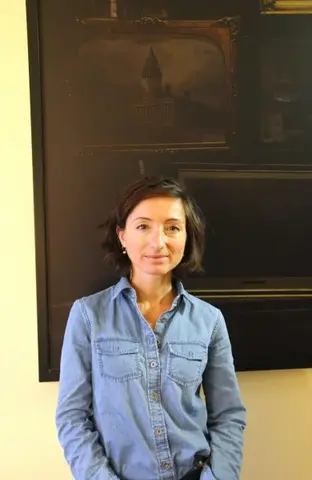Prof. Dr. Corinna Riva
corinna.riva@uni-erfurt.deAssociated Fellow (Max Weber Centre for Advanced Cultural and Social Studies)
Visiting address
Max-Weber-Kolleg für kultur- und sozialwissenschaftliche Studien
Campus
Nordhäuser Str. 63
99089 Erfurt
Mailing address
Universität Erfurt
Max-Weber-Kolleg für kultur- und sozialwissenschaftliche Studien
Postfach 90 02 21
99105 Erfurt

Distinguished Fellow
Personal Information
I am Associate Professor at the Institute of Archaeology, University College London (United Kingdom). My interests are on different aspects of Etruscan Italy, from urbanisation and the functioning of political authority in urban contexts to religion and exchange, always in the broader context of the 1st-millennium-BC Mediterranean: I am a strong believer in a multi-scalar approach to the past. My doctoral training was in protohistory or the Iron Age of Central Italy, but I have slowly moved towards the middle of the millennium when large urban agglomerations characterise several areas of the Central Mediterranean. I also have a specific interest in the history of ideas and the impact of this history on how we approach the past today. I am currently directing ‘Sustainable Vulci’, a field project at the Etruscan city of Vulci, in full collaboration with Fondazione Vulci and the Soprintendenza Archeologia, Belle Arti e Paesaggio per l’area metropolitana di Roma, la provincia di Viterbo e l’Etruria meridionale. Financed by the British Academy and the Rust Family Foundation and combining different types of investigative methods from geophysics to archaeometry and geomorphology, the project aims to understand the palaeoenvironment of Vulci and its relationship to the city’s economic production.
Research Project
Citizenship and religion in the 1st-millennium-BC Mediterranean: Etruria and Iberia
Recent studies on Greco-Roman urbanism have re-considered the role of religion in ancient conceptualisations of citizenship. Although not as text-rich in the documentary base, non-Greco-Roman Mediterranean regions deserve equal attention given the comparable sophistication of their diverse experience of urban religion and statehood. The project seeks to fill this lacuna by asking whether and how parallel trajectories to the Greco-Roman world occurred in those regions. It understands citizenship as socio-political agency of a very specific kind, structured by ties and obligations, and realised in collective participation and indebtedness that shaped the members of urban communities – a working definition that integrates sociology, political philosophy and recent findings from the Graeco-Roman world. The approach will be comparative: case studies will be drawn from southern Etruria and southeastern Iberia, from which funerary and sanctuary sites, associated to up to two urban states in each, are selected and analysed. Etruria, home to large city states that were Rome´s closest neigbours, is suitable for investigating highly centralised, long-lasting urban states that bear key resemblances to Rome. The Valencia region of southeastern Spain, corresponding to the ancient regions of Edetania and Contestania, provides an insightful contrast: it comprises a series of small urban centres, known as oppida, that controlled a territory, in a form akin to the city-state, but where political power was highly decentralised, heterarchical and driven by corporate groups. For both cases, an archaeological contextual analysis of sanctuaries and necropoleis will provide an entry into the ways in which religious practices and urban life shape each other and whether and how this reciprocal interaction allowed for the practice of citizenship.
Publications
- 2021 Violence, power and religion in the South Etruscan Archaic city-state. doi:10.1515/urbrel
- 2021 Commodities, the instability of the gift, and the codification of cultural encounters in Archaic Southern Etruria. In M. Gleba, B. Marin Aguilera, & B. Dimova (Eds.), Dressing Cities. Economies of Production and Urbanisation in Mediterranean Europe 1000-500 BCE.. Cambridge: MacDonald Institute Monographs, Cambridge.
- 2020 A Short History of the Etruscans. Bloomsbury Academic.
- 2020 The Mediterranean at the Periphery of Urban Origins. In L. Zamboni, M. Fernández-Götz, & C. Metzner-Nebelsick (Eds.), Crossing the Alps. Early Urbanism between Northern Italy and Central Europe (900-400 BC). Leiden: Sidestone Press.
- 2018 The Freedom of the Etruscans: Etruria between Hellenization and Orientalization, International Journal of the Classical Tradition 25.2, 101-126
- 2017 ‘Wine Production and Exchange and the Value of Wine Consumption in Sixth-Century BC Etruria’, Journal of Mediterranean Archaeology 30.2, 237-261
- 2010 The Urbanisation of Etruria. Funerary Practices and Social Change, 700-600 BC. Cambridge University Press. Spanish edition (2011); paperback edition (2014)

